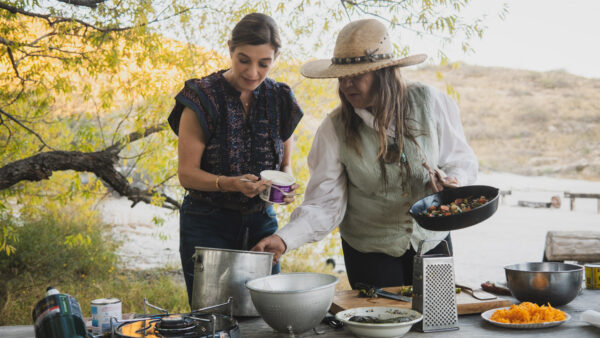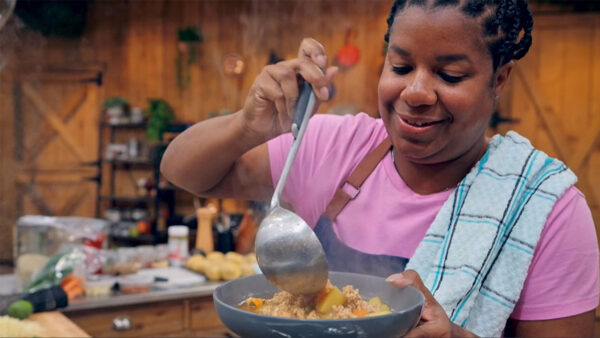Join journalist and host Cat Neville for an eye-opening journey into the heart of the food movement.
“Tastemakers” is part of an hourlong tribute to food — both locally and nationally — every Thursday night at 7:30 p.m. on Arizona PBS, immediately following new “Plate & Pour” episodes. “Tastemakers” showcases artisans, cooks, wineries and much more across the United States, “foodie” folks who are defining the flavor of American food. The series takes you to a shellfish operation in the icy waters off the coast of Washington, a sheep’s milk dairy in the rolling hills of Missouri, an organic tofu factory in the heart of Chicago, and beyond.
Each episode explores how the artisans do their work, traveling to unique corners of the country while uncovering regional food culture and history along the way. Throughout the series, you’ll also learn what drives these makers, what inspires them and how they perfected their craft.
Jan. 10: “Preserved”
Journey to the tiny town of Saxapahaw, North Carolina, where Ross Flynn works directly with Eliza MacLean of Cane Creek Farms and Charles Syndor of Braeburn Farm to source sustainably-raised heritage pork and grass-fed beef for his butcher shop, LeftBank Butchery.
Jan. 17: “Sweet Stuff”
How do you go about changing the food system? If you’re Kathleen Morgan, you make frozen custard. Travel to Houston and meet a woman with degrees in business and animal science from Texas A&M who is educating people about the food system one sweet spoonful at a time.
Jan. 24: “Not So Fast”
Heliculture, a fancy word for snail farming, is on the rise here in the U.S. Visit a tiny greenhouse in Cutchogue, New York, where tens of thousands of snails are being hand raised on foraged greens. Almost all of the escargot served in the US is imported either canned or frozen — Peconic Escargots’ Taylor Knapp is one of a very few American farmers that produce fresh escargot and snail caviar.
Jan. 31: “Fun Ferments”
The ancient preservation technique of fermentation turns out to have tremendous side benefits. Meet the team behind Edible Alchemy in San Diego. They vend at more than a dozen of the city’s bustling farmers’ markets and source directly from local organic farms, turning the region’s bountiful produce into healthful and totally delicious fermented foods, including kombucha, sauerkraut and coconut yogurt.
Feb. 7: “On the Vine”
Travel to Jack Rabbit Hill Farm in Hotchkiss, Colorado, where Lance Hanson is crafting biodynamic wines that express life on his farm’s high desert terrain. To make eau de vie, cider, gin and other beverages that reflect the character of western Colorado, Lance sources apples, pears and peaches from local organic orchards where the focus is on building healthy soils to produce amazing fruit.
Feb. 14: “Shelled Out”
Head to Coupeville, Washington, to meet Ian Jefferds. He is on the forefront of sustainable shellfish farming, growing and harvesting delicious oysters, clams and mussels that are beloved by the fishmongers at Pike Place Fish Market and Seattle’s best chefs.
Feb. 21: “Extracted”
Cat travel to Pitts, Georgia, to meet Clay Oliver. His cold-pressed, unrefined oils, made from sunflower seeds, pecans, peanuts, okra seeds and sesame seeds, have become one of the South’s most sought-out ingredients, with James Beard-winning chef Steven Satterfield among its fans.
Feb. 28: “Warm and Wooly”
Visit a farm in Weston, Missouri, that specializes in cheese made from rich and creamy sheep’s milk. Green Dirt Farms’ cheeses begin in the pasture, with well-tended soil that grows a range of prairie grasses which develop seasonal flavors in the cheeses depending on what’s in the field. That milk is turned into bloomy rind, washed rind, aged and fresh cheeses, which pair beautifully with local wine from nearby Terra Vox.
March 21: “Pucker Up”
Host Cat Neville meets Alden and Val Bing, a couple crafting sour beers that celebrate Indian River County’s farming history and make the most out of Florida’s humidity by pulling water for their beers from the air using condensing units.
March 28: “Out of the Box”
Cat Neville heads to Boston to meet the team at Freight Farms. They are building self-contained hydroponic farms from cast-off shipping containers that can be controlled with an app and make growing food anywhere, in any climate, possible.
April 4: “In the Wild”
From his home base on Broken Arrow Ranch in Texas, Chris Hughes travels across the state, harvesting game on Texas ranches in a humane, sustainable way. Those animals are processed on site using a mobile processing unit that was pioneered by his father.
April 11: “Soy to the World”
Travel to Chicago to meet Jenny Yang, the woman behind Phoenix Bean Tofu. While the country’s third largest city may seem disconnected from Illinois, a highly agrarian state, Illinois produces the highest volume of soybeans of any state and some of those beans make it to Phoenix Bean, whose tofu you’ll see on the menus of some of the city’s best restaurants.
April 18: “Grounded”
Cat Neville heads to Louisvillle, Kentucky, to meet Tom Edwards of Louismill and MozzaPi. He works directly with grain farmers to source wheat, rye and corn and that he stone grinds into flour and grits, some of which he bakes into breads and tosses into pizzas that are baked in his wood-fired oven.























